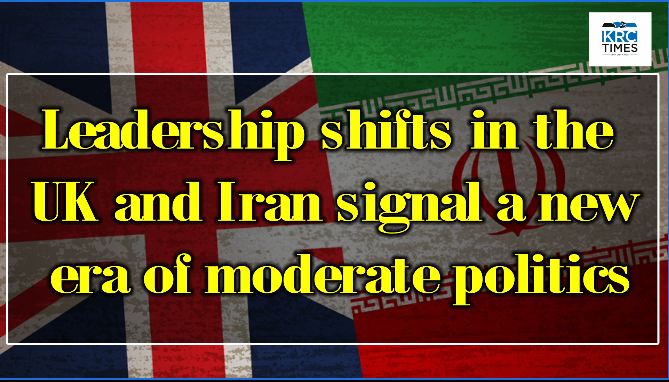The recent election results in the UK and Iran reflect a broader global trend of voters favouring leaders who advocate for inclusivity and moderation
 KRC TIMES Desk
KRC TIMES Desk

Akhilesh suman
There has been a change of leadership in both the United Kingdom and Iran. In the UK, Rishi Sunak of the Conservative Party has been succeeded by Keir Starmer of the Labour Party. In Iran, the people have elected Masoud Pezeshkian, a reformist and relatively liberal candidate, as their new President.
The Iranian presidential election was necessitated by the death of the former President, Ebrahim Raisi, in a helicopter crash in May.
These shifts, one in Europe and the other in Asia, represent a change in the mindset of people across continents. Both countries, with their rich traditions and civilizations, have seen their electorates reject hardliners in favor of moderate leaders and parties.
This highlights how, when given the choice, people make thoughtful decisions on a large scale, guided by the current needs rather than the incessant rhetoric of hardliners invoking civilization and nationalism. The Labour Party in Britain had been out of power for the last 14 years. Many predicted the party’s demise and believed the country would remain under Conservative rule indefinitely.
The Conservatives, driven by their nationalistic desires, even led the UK out of the European Union, isolating the nation from its neighboring democracies.It is noteworthy that while the Conservatives’ loss marks a historic low in the context of British democracy, the significant increase in seats for the Liberal Democrats, from 11 in 2019 to 72 now, represents a historic high.
As the Liberal Democrats are considered somewhat more left-leaning than even the Labour Party, there is a renewed emphasis on improving the quality of life for the common man, more so than at any other time in the country’s political landscape.Conversely, since the Islamic Revolution in 1979, Iran has consistently positioned itself against the West to assert its sovereignty.
This stance has not only led to cultural conflicts with the West but also created significant challenges for Iran’s economy. Its isolation and confrontations with G7 nations have weakened its oil-based economy.
Additionally, the Iranian people have periodically expressed their dissatisfaction with the country’s social laws.With the recent changes in leadership in Britain and Iran, both new leaders have pledged to end their countries’ isolation and foster global friendships. This suggests that the UK may seek to renew ties with the European Union, and Iran may aim to improve relations with the West.
It will be interesting to see if Keir Starmer will reconsider Brexit and move the UK closer to the EU.Similarly, as the new Iranian President promises to “extend a hand of friendship to everyone,” it remains to be seen whether this will lead to peace with the USA and, eventually, with tech-rich Israel.
It will also be intriguing to observe if the Iranian leader can persuade the Supreme Leader to return to the Nuclear Non-Proliferation Treaty (NPT) framework, which is the main reason for Iran’s isolation in the West.These election results suggest a potential leftward shift in global politics, with significant changes occurring in both major European and Asian countries.
This could mean that governments will need to focus more on job creation and improving the quality of life for their citizens. Britain is currently facing financial difficulties and high inflation, despite soaring property prices.
Similarly, the Iranian people are feeling the weight of ever-increasing sanctions imposed by the US and its allies. Iranians need a new economy and a new approach to their relations with the West.While Western nations are cautiously optimistic about the change in Iran, they are confident that the new Labour leadership in the UK will adopt a pragmatic approach. Moving away from the Conservative tactics of unnecessary assertiveness driven by nostalgic colonial attitudes, the UK will need to redefine its strategy and engage more openly with the public.
Finally, there is a message for political parties worldwide: if you stay connected with the grassroots and continue to address the issues of the common people in pragmatic ways, you will remain relevant and potentially revive.
(The writer is a senior journalist and has been covering foreign affairs and international politics; views are personal)



